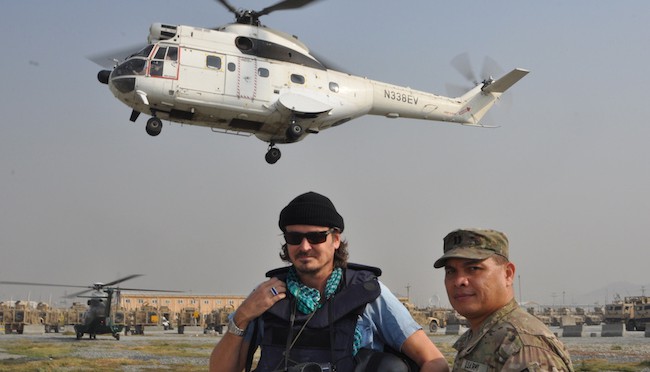
ROCKET CITY
On my first morning in Kandahar I’m not sipping apple tea and watching camel caravans go by as I had vaguely imagined would be the case in my Silk-Route reveries.
From the media ops compound next to the airfield, I didn’t hear the first explosion, but the wailing siren soon had me awake and rolling out of bed and onto the floor in the regulation prone position. “Rocket attack…rocket attack” said the recorded female voice over the camp PA system, in that GPS-sounding, otherworldly voice.
The next krump of explosions echo around the airfield at various intervals, all followed by the siren and the robotic voice of “rocket attack”. In the distance a brief rattle of small arms fire is heard and armoured trucks start roaring by to check the perimeter. In the space of about 4 hours that morning the Kandahar base takes 9 rocket hits I’m told later, by our local Company Commander. It was the first day of the Muslim festival of Eid and it seems the Taliban was intent on marking the day with attacks all over the country. Kandahar is particularly prized by the Taliban, since they once had their headquarters there and made their last stand in its airport terminal before becoming an insurgency force again.
This is also the day I am supposed to be flying to Tarin Kot in Uruzgan province, where Australia has maintained its main base in Afghanistan. I start to wonder if we’ll be able to take off. During a lull I get driven by the local PAO (Public Affairs Officer) to Camp Baker, the Australian base next to the airfield. Check-in proceeds as normal and flight remains scheduled. I’m told I’ll need a long sleeve shirt to fly, so the PAO (Public Affairs Officer) and I take the short 5-minute drive back to the media ops compound to grab one. Along the way another rocket attack comes in. We are quickly out of the vehicle and hugging a nearby concrete wall, watching others abandon their vehicle on the road and head for bomb shelters.
The rockets are mainly Chinese made 120mm rounds fired from crude wooden platforms made in an X formation. As a result they are not particularly accurate and seemingly land anywhere around the large Kandahar base and airfield. Their very randomness can add to the uneasiness.
My 5-minute dash back to the compound turns into an hour-long wait beside thick concrete. We head back to the media ops compound to get my shirt when the sirens wail again and it is announced we are now at “level 3 alert”.
“Ok guys, full battle rig on,” says Staff Sgt Rob Oson and suddenly we are all clamouring into armour and helmets. The light-hearted banter is gone and we go quiet, ears straining to pick up what is going on around us. How often does this happen I ask, wondering if this is fairly common?
“We take rocket hits pretty often, but this is first time since I been in-country that we’ve gone to a level 3 alert” he says. Given the serious look etched on his face, I take this as slightly ominous. I begin to ask what “level 3” means, but watching SSG Joshua Breig next to me beginning to push rounds into magazine clips for his M16 rifle I realise it is probably a superfluous question. This could go bad. Breig answers the question before it is out of my mouth.
“It means we are under sustained rocket attack and there’s probably some Taliban ground forces probing our perimeter. Who knows where this is going to go.”
“It would be a bad day if even us PAOs have to fight…” Oson chimes in, before launching into tales of his previous Iraq deployments.
We wait another hour behind the thick concrete t-walls of our compound before deciding to do the run back to Camp Baker. By this stage I assume that flight is cancelled for sure, but in fact I’m back just in time for the briefing and then with a group of Aussie soldiers and contractors we are on a bus and heading for the tarmac to a waiting RAAF C-130.
Around us, the sky is full of flying machines as helicopter gunships, scout planes, drones and F-16 fighter jets patrol the area looking for where the probes and rocket attacks are coming from. You can feel a bit of a sitting duck, out there on the tarmac on a day like this, but it is some comfort to know there are a lot of people and a lot of serious hardware deployed right now to clear our way through and out of Kandahar.
Soon we are in the air and heading for Uruzgan, where I hope to find a bunch of Melanesian soldiers operating with the Aussies.

